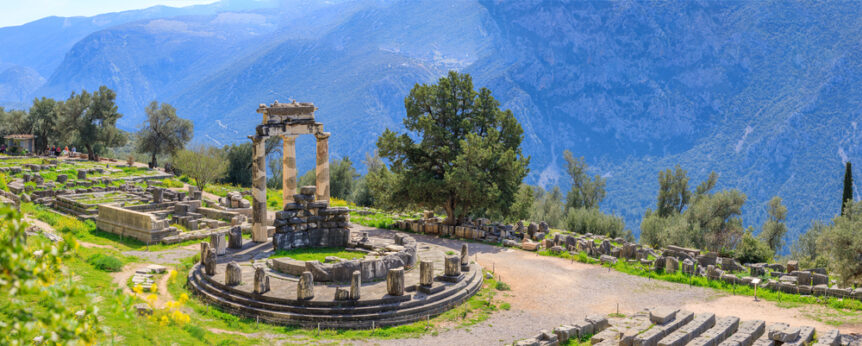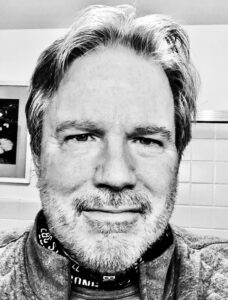
Guadalcanal, the Giant Clam, and the Oracle of Delphi
by Michael Ledwith
April 21, 2023
My friend’s father was a combat surgeon in the Pacific. He would tell us stories that were hard to believe.
That he was wounded when he used hand grenades to blow up fish in the lagoon at Guadalcanal for dinner. That he was abandoned by mistake on an island when he went hunting without permission and survived for two weeks dodging Japanese patrols. That on the island he had killed two huge Japanese Marines with his over and under shotgun. He said it was the only time he was scared in the war because he had to kill each of them with one shot because he would have never had time to reload.
He told us he met island natives and made love to a chieftain’s daughter during an air raid and never really enjoyed sex since. He said that he always felt that there was a blue-eyed, half Irish Melanesian chief out there somewhere and when he found himself widowed or divorced he would buy a sail boat and go back to the South Pacific and try to find the island and my friend’s half-brother.
All of us called him Dr. Emmett, even his sons. His wife called him ‘The Doctor’ but rarely talked to him at all. We thought it was because she had heard the story about the air raid and the chieftain’s daughter one too many times.
He told us that nobody was ever wounded in the movies. He would drink his Irish whiskey neat and tell us about the effect of high explosives on human beings. He said combat wounds looked like raw hamburger and purple ropes and were always attached to someone young and someone who was screaming or dead. It was not, he said, anything like the movies.
That was why he never went to war movies. He said that the movies didn’t let you know about the smells of the wounded or the smells of a battle or the smells of rotting coconut and hot swamps and sweat and not bathing for weeks and always the smell of dead bodies and shit lying around. Shit because some people, not many, still could take a shit during an artillery barrage. But, you just pulled your pants down and did it right there so it was all over the place. Movies, he said, never showed that.
We would listen to him for hours and watch the sun set back over the pond in Osterville and look out at the road to the ocean and try to imagine him as a young man and try to smell the smells he remembered.
He was short and broad shouldered and had thick forearms.
He looked more like a stevedore than a doctor. He loved our attention and would tell outlandish stories about recovering the largest salt water clam in the world from the lagoon at the Bikini Atoll after the H-Bomb test. He was called back into the Navy and watched it from the deck of a cruiser.
He discovered the clam, opened shelled and in distress while spearfishing one morning. He told us we could see it at the Smithsonian in Washington. Or, when asked to edit poetry for a book on modern poetry he would only accept poems that rhymed.
At dinner we talked about world affairs and history, but not the war. I think that the mom had made a rule that he couldn’t talk about the war at dinner. He and his wife had both gone to Ivy League colleges before the war and they were very well read. They would discuss the Cold War and had met many of the leaders involved. The Doctor had treated Admiral Nimitz and the mom had grown up in Washington and knew, it seemed, everyone. She would make jokes about the Kennedy’s and the Doctor would act jealous because she had known Jack Kennedy when they were both young. It seemed to us that he might have been her chieftain’s daughter at some time, although my friend was the spitting image of the Doctor and also liked Irish whiskey.
The Doctor had read a book about the one hundred most important people in history and over one weekend the list dominated the dinnertime conversation. I remember that Jesus was first and Spinoza was last. Jack Kennedy hadn’t made the list nor had Nimitz, but Eisenhower was on it and Churchill and Gandhi and the Doctor’s favorite, Pizarro. He had conquered Peru and he was listed before Cortes. I objected and in my objection sealed the Doctor’s friendship. He loved a good argument, he loved good conversation, and he loved history.
After dinner we would sit in front of the fire and he would quiz us on geography. He would pull out an enormous atlas to show us the cities and countries and oceans he had asked us about. He was an expert on most parts of the world. After the war he couldn’t be anyplace for long and he traveled all over the United States, riding the rails like a hobo.
Then he took a tramp steamer to Europe and lived rough for over a year. I think this was another sore subject between the Doctor and his wife. It seemed that they had gotten married right after he had returned from the war and he had left her in Washington with her parents just after the honeymoon.
He had to go, he said. And she understood.
Her only solace was that he had changed so much in the war that she didn’t really know him when she married him. But he was much more like himself when he came back. She walked past him at the train station and didn’t recognize him when he returned. He came back brown as a Melanesian and skinny as if he had been a POW.
The Doctor had sent hundreds of letters while he traveled. She had kept the ones that weren’t about the chieftain’s daughter. They were mostly funny, she said, filled with history, and places, and people he had met in his travels and he should publish them someday.
One night after he had gone to bed she read one to us. He had written it while he camped at Delphi, a hole in the ground in Greece. In ancient times it had been an Oracle, that is, a place that was sacred and could tell you the truth of your past and if you listened closely would tell of your future. In his letter he wrote that he went there every morning and every evening and sat and hoped that the Oracle would speak to him. One night, when the moon was full, the Oracle told him why he hadn’t died in the war. It told him why he had met her and why he had married her. It disclosed the reasons why he loved her and that he would only love her in this life. He listened and after learning so much about himself he decided to come home. He lay under the moonlight one last night. It came to him and told him how many children they would have. He knew their names and he knew when they would be born. He had written to her about Luke, my friend, years before he was born.
She put the letter away and I asked her why she had read that one. She said it was the only one she liked to read again and again. He hadn’t really come back from the war before he left again. The letter was when she knew he would come back.
So, he came home from Delphi? That is so romantic, I said. Knowing he loved you, knowing of your children.
No, she answered, it was another six months.
No matter what the Oracle had said, he had wanted to see Troy and bathe naked in the Ganges before he was through.
-30-
 Frequent contributor Michael Ledwith is a former bag boy at Winn-Dixie, who worked on the Apollo Program one summer in college. A former U.S. Army officer, he ran with the bulls in Pamplona and saw Baryshnikov dance ’Giselle’ at the Auditorium Theater. Surfer. Rock and roll radio in Chicago. Shareholder, Christopher’s American Grill, London. Father. Movie lover—favorite dialogue: “I say he never loved the emperor.”
Frequent contributor Michael Ledwith is a former bag boy at Winn-Dixie, who worked on the Apollo Program one summer in college. A former U.S. Army officer, he ran with the bulls in Pamplona and saw Baryshnikov dance ’Giselle’ at the Auditorium Theater. Surfer. Rock and roll radio in Chicago. Shareholder, Christopher’s American Grill, London. Father. Movie lover—favorite dialogue: “I say he never loved the emperor.”


Comments 10
Quite some complicated expression of so many thoughts and emotions in one short piece of writing.
Xristos Anesti John.
Interesting, very interesting article, thank you! I’ve been to Greece and to Delphi, a most amazing, stunning, and breathtaking place.
Xristos Anesti, John. Thinking of you and praying for continuing progress in your recovery 🙏
Brilliant, funny, and delightful. I don’t know where you found this guy Kass, but he is gold and never disappoints.
Houli
Beautiful, simple story about a man (and a woman) you’d probably never forget. Thank you.
A little off topic, but was brought back to my mind with the mention of the Oracle at Delphi is a book titled “ The Immortality Key” by Muraresku. An excellent,well researched bit of history.
Reminds me of conversations with my Dad, uncles, and their WWII Veteran friends. Great stories, and a couple of them were probably true. Thanks for the memories.
a great Friday read. Thanks Michael…
Actually kind of a surprising piece. Having grown up at a time when just about every dad had been in the war, it was rare that any of them ever spoke of it. With some one could sense that a post-war battle was still going on in their heads. Studs Terkel’s “The Good War” is an eye opener.
Xristos Anesti Yianni. Wishing you best of health and continued rehab! I’m reminded of a plaque that was on the desk of a USSteel exec I called on years ago that has served me well in times of trials and troubles – simply said “This, too, shall pass!” Onward and upward, Eis Anotera!!!